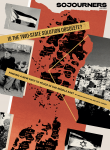ON HIS DEBUT record, Palisade, released in 2012, Americana wunderkind Parker Millsap ends the title track singing with blues-soaked vocals, “Writing on a blank white page keeps my demons one more day away.” For Millsap, an Oklahoma native who now calls Nashville home, those lyrics weren’t just a young artist trying to sound profound; they spoke truth to his experience with music and faith.
“When I’m playing [music] with other people and for other people, there is something about it that will always feel spiritual to me,” says Millsap. “After all, that spiritual feeling, that’s the context I first received music in.”
Millsap grew up in a Pentecostal church in a small Oklahoma town, and says if people were going to speak in tongues or run around the sanctuary, it was almost always during the music. “I always resonated with using music to reach ecstatic states,” he says. “As soon as I could play enough chords to keep up, they put me down in front at church.”
It wasn’t only performing that drew Millsap in; the communal aspect of music was just as important. “I wouldn’t be doing this today if it weren’t for growing up in that context,” he says.
As Millsap grew older and became a stronger guitarist and songwriter, he began to face some difficult realities of what it means to be part of organized religion. But he doesn’t dwell on the negative experiences he or his friends have had over the years. “What’s great about music is that it can transcend all of the dogmas and all of the rules and all of that,” he says. “Whatever God is called—Jesus, God, a collective unconscious, whatever—when you’re playing music, that’s connecting to God or your higher power. That’s communing with all of the parts of reality at once.”
Though he has sought to experience that communion ever since learning how to play guitar, Millsap seems most connected with his own higher power on his latest album, Be Here Instead—his fifth LP in nearly a decade. While the tracks don’t appear explicitly about religion or church, it doesn’t take long for the listener to hear Millsap preaching, or more likely, praying. He finds a great deal of hope in the hymns he grew up with and did his best to replicate some of that on Be Here Instead.
“It was my goal to make these songs feel like hymns,” he explains, “to have some secular hymns or prayers that I could say to myself. The working title of the album and the original title for the song ‘Vulnerable’ was ‘Note to Self,’ because I really feel like a lot of these songs are things that I needed to write in order to say them to myself.”
Just as he sang about filling a page to keep the demons away back in 2012, Millsap continues to find new ways to guard himself through his music. “I just have to let go of as much guilt and anger as I can,” he says. “I was young and in the church and didn’t know anything else, and then as I became a teenager, I started to discover the world and other religions and things like that. I began to see how the message of Christ had been perverted, and I really turned my back on it for a while. I was angry at the church, I was angry at whatever I thought Jesus was.”
Over time Millsap began to shift his perspective. “I don’t know how to change these negative dogmatic practices I see all around,” Millsap says with a humble yet serious inflection in his voice, “but what I do know is how to reframe things. For me, it’s about thinking of Jesus as the radical hippie who said, ‘Just think in your head that you’re saved and you’re saved. You don’t have to feel guilt anymore.’ I mean, how radical is that?”
Although he doesn’t view himself as an active Christian because he doesn’t go to church every Sunday, he seems proud to admit that he retains a sense of what he calls “Christ consciousness.” “What I mean is that in my deep lizard brain, the models of good and bad behavior are still very much wrapped up in Jesus,” he explains. “I just have to figure out what parts really work for me and what parts really offend my sense of justice, and then let go of those things. That process, that consciousness, it all affects the songs that I write, and I think I really felt that on this new album.”
For much of his career, Millsap has written songs from the perspective of other people, acting as narrator for his characters. On Be Here Instead, he wrote with much more personal introspection and explored some new musical ground, too. “These songs are tools for self-exploration,” Millsap says. “I needed to do some serious soul-searching with my music, and now that I have a little more experience and age, I guess I had a little more confidence to write songs that talk about my own experience now.”
With this increased confidence, Millsap has written and recorded the masterpiece of his career, offering his own personal hymns for the world to hear. Songs like “In Between” and “The Real Thing” speak prophetic hope to a world ravaged by a pandemic and racial injustice. “Vulnerable” and “It Was You” push listeners to look outside of themselves to find communion with those around them.
But no matter how Millsap writes or what introspection he undertakes, somewhere in his “deep lizard brain” he looks to Jesus as the hero of his particular story, and there’s no doubt that will continue to influence the words he chooses to sing for a listening world. “I definitely don’t see all the people who have done terrible things in his name as heroes, but I still think the source is pretty good.”

Got something to say about what you're reading? We value your feedback!







